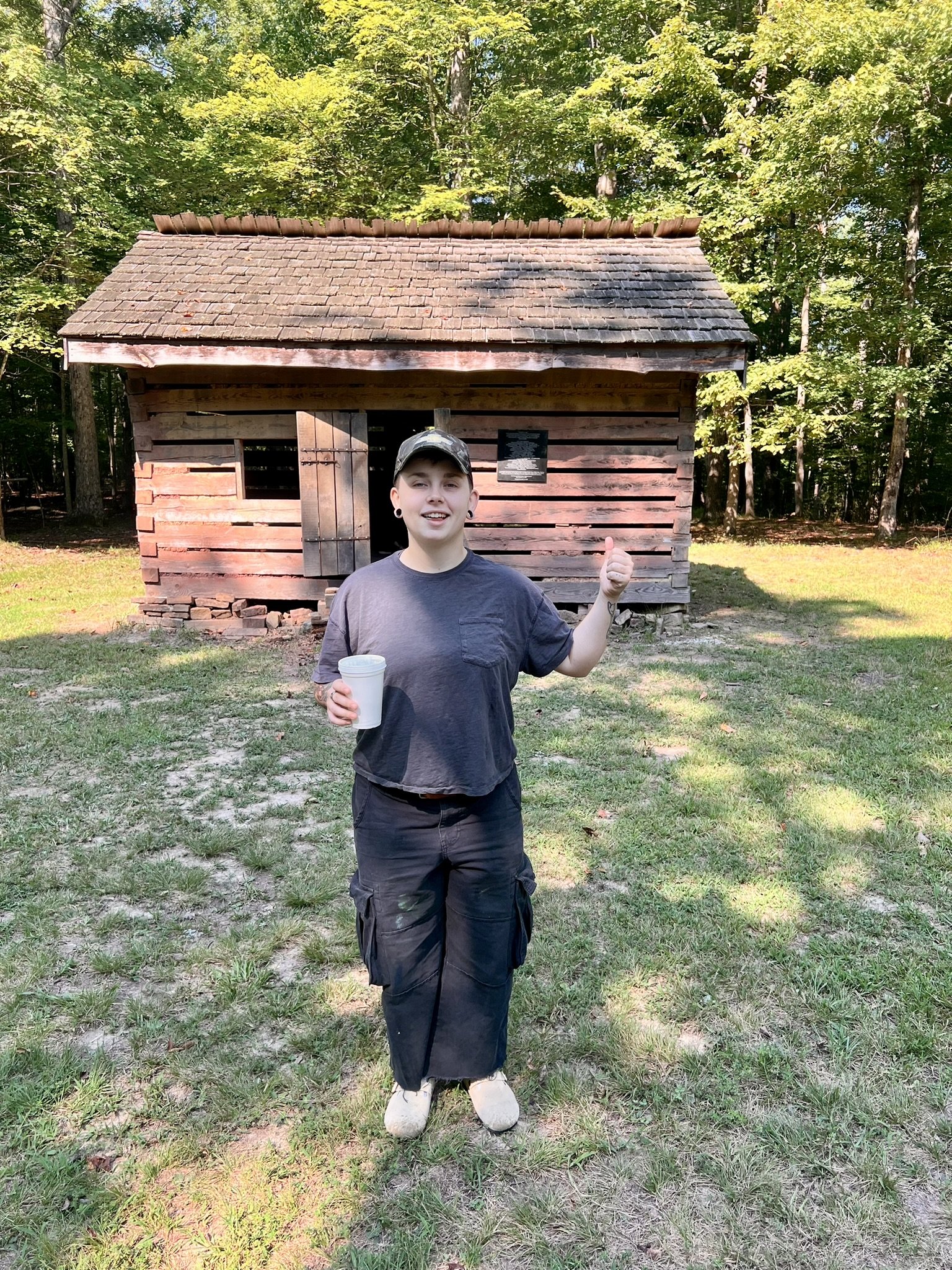Lincoln's Logs // RUX Third Weekend Guest Blog
“Our energy in that space mixed and meshed with the cultural history of the site and the Lincoln cabins across the world, creating what I would define as the epitome of what Public History means to me.”
The following blog post was recently written by Emma Bryan, a Rural-Urban Exchange (RUX) alum and member of the RUX Alumni Committee, recently planning the Third Weekend gathering from August 9-11, 2024, at Carter Caves.
When folks ask me, “What is Public History?” a question I receive, on average, every other day, I typically respond with the canned answer that I developed as a defense mechanism throughout grad school. I say, “Oh, it’s a pretty general field of study that sets historians up to work in public-facing roles at places like museums, libraries, archives, or national parks! Public Historians also often become podcasts hosts, filmmakers, oral historians, writers, and more. Public History allows a person to work with and engage with history in realms outside academia and traditional educational environments.”
I’d like to share a story that illustrates what public history is, or could be, at its most authentic and meaningful application:
The Kentucky Rural-Urban Exchange gathered for the Third/Alumni Weekend in Carter Caves State Park on August 9-11, 2024. People from all over the state coalesced in the park finding themselves in the lodge, in cottages, on the campground, around a fire, in a creek, in caves, in the pool, on a trail, or in Airbnbs nearby.
Nestled against the trees near the back of the primitive campground at the park sets a small, log cabin. Kentuckians can spot a Lincoln Log Cabin replica a mile away, and as someone working in my field for some time, I can spot faux Lincoln Log Cabins fairly immediately.
A group of RUXers found themselves drawn to the little log cabin against the trees. Ceirra Evans went exploring first and hollered out to me, “Emma! Come look at Lincoln’s Logs!”
Ceirra Evans outside of Lincoln’s Logs in Carter Caves State Resort Park, August 10, 2024.
The cabin reconstruction had been dedicated in November of 2009, during the Lincoln Bicentennial Celebration that happened across the Commonwealth and the nation.
Folklorist Dr. Ellie Hasken-Wagner and I launched into our monologue, “What’s interesting to us about this cabin is not whether or not these are truly Lincoln’s Logs (they’re not), but rather WHY they were put here in the first place. Who decided to reconstruct Lincoln’s boyhood home in Carter County, Kentucky, nearly 200 miles away from his birthplace? When did they put it there? Who was there during the dedication? And what do these questions tell us about a community, a time, and a place?”
To answer a few of these questions, the project was conceived and executed by the Olive Hill Historical Society. Gerry van der Meer, Parks Commissioner, had given permission for the cabin replica to be placed at Carter Caves. At the dedication ceremony on November 28, 2009, an actor by the name of Jack Wilkinson played Abraham Lincoln. President Lincoln arrived to the site in a horse-drawn carriage where he proceeded to orate famous speeches and offered musings to the crowd gathered there. The bronze plaque affixed to the exterior of the cabin reads in big, bold, capitalized letters, “LINCOLN’S LOGS,” and lists the contributors to the project. The plaque was donated and mounted by Lambert Monument Company [1].
If community members can gather for a Lincoln drag show in 2009, well, by-golly some RUXers will gather for a little drag in 2024. What followed that sunny morning in Carter Caves was a dance party in the Lincoln’s Logs, by the usual suspects: Ceirra, Ellie, Jody Dahmer, Alexis Erskine, Amanda James, Alex Hezik, and Sarah Schmitt, while Shaelyn Bishop looked on lovingly from the windowsill. We danced to and sang songs by Chappell Roan, The Dare, Kesha, and Kim Petras.
Jody Dahmer playing accordion in Carter Caves State Resort Park, August 10, 2024.
Our energy in that space mixed and meshed with the cultural history of the site and the Lincoln cabins across the world, creating what I would define as the epitome of what Public History means to me. Which is, to take and understand the history or story or lore of a person, place, or thing, and make it usable, relevant, and meaningful to me, or to us in the present moment.
What was usable, relevant, and meaningful to the gaggle of friends, old and new, on that sunshiny morning and even late into the wee hours of the night was to move our bodies and use our voices in harmony, in community, and in joy to the sounds of the Queer musicians that color our playlists in coffee shops, in cars, in bars, or wherever we might find ourselves throughout Kentucky and beyond.
I need someone to dedicate a plaque to Jody Dahmer’s breakdancing skills in the Lincoln’s Logs.
—Emma Bryan
Emma Bryan is a Public Historian, cultural worker, and writer from central Kentucky.
[1] Olive Hill Historical Society, “Reconstruction of Lincoln’s log cabin at Carter Caves dedicated during ceremony.” Herald Dispatch. December 5, 2009.


